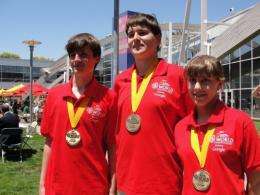Russian teens world geography bee champs

They had to identify countries and regions of the world by economies, politics, latitudes -- even by a type of tortoise.
On Wednesday, the National Geographic world championship between teenagers from Canada, Russia and Chinese Taipei hinged on knowing which island has a population of about 57,000 people, with most settlements on its West coast.
US game show host Alex Trebek, who presided over the "brain Olympics" at Google's campus in the California city of Mountain View, added that little of the large island is fit for farming.
Egor Shustov, Masha Samoletova, and Alexander Bondarchuk knew that the gold medal would go to Russia.
The three 16-year-olds had the answer to that final question -- Greenland -- and they held a narrow lead.
"We realized we were the champions," Shustov said of the moment as he and his teammates basked in sunshine and victory not far from people playing volleyball in a Google courtyard.
"Sometimes I made stupid mistakes, but sometimes very difficult questions were easy for me," the Russian team captain said while looking back at the competition that featured teams from 17 countries.
Rare species of owl, tortoise and porcupine were used as clues for questions, along with video clips from Google Earth interactive online atlas, tribal drums, and recordings of dying languages.
Cities, waterways, volcanoes, islands and other geographic points had to be deduced from hints, and errors spotted in maps.
Each of the finalists was stumped at one point or another in a play-off said to pack some of the toughest questions heard at the 20-year-old competition.
"Geography is really about the world and understanding it," National Geographic chief executive John Fahey said after the championship.
"Even though this looks like just a quiz show kind of thing, it is really about having the basic understanding that you need to address some really big issues that we all face," he continued.
He cited challenges such as sustainably feeding a surging global population and stopping the devastation of ocean life.
"National Geographic's role is to get people to learn about the planet and to care about it, and Google has really picked up that mission and run with it," Fahey said.
The Internet giant has shown a devotion to environmental causes that includes investing in green energy and working with famed ocean defender Sylvia Earle to let people explore precious undersea worlds virtually at Google Earth.
Google hosted the geography championship to spotlight the importance of learning about the world and everything in it, according to Google Earth vice president Brian McClendon.
"One thing it forces us to do is make Google Earth a better education tool," McClendon said, noting that the service is already incorporated in school lesson plans.
"The users of Google Earth have always been children, and they are very passionate," he continued.
Po-Chen Chu, 14, of the Chinese Taipei team was just five years old when he began watching a National Geographic channel on television.
"This experience is so important to the future," said Taipei team member Chen-Luo Cheng. "I will try to get more chances to go abroad and learn about the world by traveling."
A drawback that teammate Tong-hong Hsu pointed out was that after placing third in the world for geography smarts they will be expected to know all the answers at school back home.
"If you have not traveled, you tend to think your country is the center of the universe," Trebek said after the championship.
"If you know geography, you know how civilizations developed in this or that part of the world and if you can understand them, you stand a better chance of getting along with them," he continued. "That is why geography is so important."
(c) 2011 AFP




















